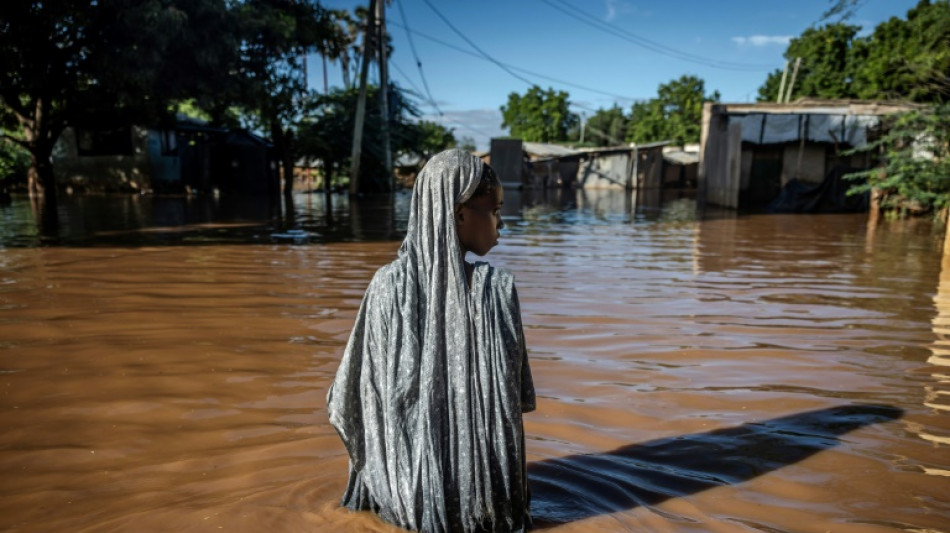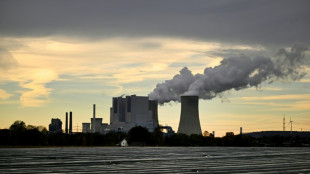
-
 LA mayor urges US to reassure visiting World Cup fans
LA mayor urges US to reassure visiting World Cup fans
-
Madrid condemned to Champions League play-off after Benfica loss

-
 Meta shares jump on strong earnings report
Meta shares jump on strong earnings report
-
Haaland ends barren run as Man City reach Champions League last 16

-
 PSG and Newcastle drop into Champions League play-offs after stalemate
PSG and Newcastle drop into Champions League play-offs after stalemate
-
Salah ends drought as Liverpool hit Qarabag for six to reach Champions League last 16

-
 Barca rout Copenhagen to reach Champions League last 16
Barca rout Copenhagen to reach Champions League last 16
-
Arsenal complete Champions League clean sweep for top spot

-
 Kolo Muani and Solanke send Spurs into Champions League last 16
Kolo Muani and Solanke send Spurs into Champions League last 16
-
Bayern inflict Kane-ful Champions League defeat on PSV

-
 Pedro double fires Chelsea into Champions League last 16, dumps out Napoli
Pedro double fires Chelsea into Champions League last 16, dumps out Napoli
-
US stocks move sideways, shruggging off low-key Fed meeting

-
 US capital Washington under fire after massive sewage leak
US capital Washington under fire after massive sewage leak
-
Anti-immigration protesters force climbdown in Sundance documentary

-
 US ambassador says no ICE patrols at Winter Olympics
US ambassador says no ICE patrols at Winter Olympics
-
Norway's Kristoffersen wins Schladming slalom

-
 Springsteen releases fiery ode to Minneapolis shooting victims
Springsteen releases fiery ode to Minneapolis shooting victims
-
Brady latest to blast Belichick Hall of Fame snub

-
 Trump battles Minneapolis shooting fallout as agents put on leave
Trump battles Minneapolis shooting fallout as agents put on leave
-
SpaceX eyes IPO timed to planet alignment and Musk birthday: report

-
 White House, Slovakia deny report on Trump's mental state
White House, Slovakia deny report on Trump's mental state
-
Iran vows to resist any US attack, insists ready for nuclear deal

-
 Colombia leader offers talks to end trade war with Ecuador
Colombia leader offers talks to end trade war with Ecuador
-
Former Masters champ Reed returning to PGA Tour from LIV

-
 US Fed holds interest rates steady, defying Trump pressure
US Fed holds interest rates steady, defying Trump pressure
-
Norway's McGrath tops first leg of Schladming slalom

-
 Iraq PM candidate Maliki denounces Trump's 'blatant' interference
Iraq PM candidate Maliki denounces Trump's 'blatant' interference
-
Neil Young gifts music to Greenland residents for stress relief

-
 Rubio upbeat on Venezuela cooperation but wields stick
Rubio upbeat on Venezuela cooperation but wields stick
-
'No. 1 fan': Rapper Minaj backs Trump

-
 Fear in Sicilian town as vast landslide risks widening
Fear in Sicilian town as vast landslide risks widening
-
'Forced disappearance' probe opened against Colombian cycling star Herrera

-
 Seifert, Santner give New Zealand consolation T20 win over India
Seifert, Santner give New Zealand consolation T20 win over India
-
King Charles III warns world 'going backwards' in climate fight

-
 Minneapolis activists track Trump's immigration enforcers
Minneapolis activists track Trump's immigration enforcers
-
Court orders Dutch to protect Caribbean island from climate change

-
 Sterling agrees Chelsea exit after troubled spell
Sterling agrees Chelsea exit after troubled spell
-
Rules-based trade with US is 'over': Canada central bank head

-
 Lucas Paqueta signs for Flamengo in record South American deal
Lucas Paqueta signs for Flamengo in record South American deal
-
Holocaust survivor urges German MPs to tackle resurgent antisemitism

-
 'Extraordinary' trove of ancient species found in China quarry
'Extraordinary' trove of ancient species found in China quarry
-
Villa's Tielemans ruled out for up to 10 weeks

-
 Google unveils AI tool probing mysteries of human genome
Google unveils AI tool probing mysteries of human genome
-
UK proposes to let websites refuse Google AI search

-
 'I wanted to die': survivors recount Mozambique flood terror
'I wanted to die': survivors recount Mozambique flood terror
-
Trump issues fierce warning to Minneapolis mayor over immigration

-
 Anglican church's first female leader confirmed at London service
Anglican church's first female leader confirmed at London service
-
Germany cuts growth forecast as recovery slower than hoped

-
 Amazon to cut 16,000 jobs worldwide
Amazon to cut 16,000 jobs worldwide
-
One dead, five injured in clashes between Colombia football fans


Last 2 years crossed 1.5C global warming limit: EU monitor
The last two years exceeded on average a critical warming limit for the first time as global temperatures soar "beyond what modern humans have ever experienced", an EU agency said Friday.
This does not mean the internationally-agreed 1.5C warming threshold has been permanently breached, but the Copernicus Climate Change Service said it was drawing dangerously near.
The EU monitor confirmed that 2024 was the hottest year on record, surpassing 2023 and extending a streak of extraordinary heat that fuelled climate extremes on all continents.
Another record-breaking year is not anticipated in 2025, as climate sceptic Donald Trump takes office, and a deadline looms for nations to commit to deeper cuts to rising levels of greenhouse gases.
But the UK weather service predicts 2025 will still rank among the top three warmest years in the history books.
This excess heat supercharges extreme weather, and 2024 saw countries from Spain to Kenya, the United States and Nepal hit by disasters that cost more than $300 billion by some estimates.
Los Angeles is battling deadly wildfires that have destroyed thousands of buildings and forced tens of thousands to flee their homes. US President Joe Biden said the fires were the most "devastating" to hit California and were proof that "climate change is real".
Copernicus said sustained, unprecedented warming made average temperatures over 2023 and 2024 more than 1.5 degrees Celsius hotter than pre-industrial times.
Nearly 200 nations agreed in Paris in 2015 that meeting 1.5C offered the best chance of preventing the most catastrophic repercussions of climate change.
But the world is nowhere on track to meeting that target.
"We are now teetering on the edge of passing the 1.5C level," said Copernicus climate deputy director Samantha Burgess.
- Climate extremes -
Copernicus records go back to 1940 but other sources of climate data, such as ice cores and tree rings, allow scientists to say the Earth today is likely the warmest its been in tens of thousands of years.
The 1.5C threshold is measured in decades, not individual years, but Copernicus said reaching this limit even briefly illustrated the unprecedented changes being brought about by humanity.
Scientists say every fraction of a degree above 1.5C is consequential, and that beyond a certain point the climate could shift in ways that are difficult to anticipate.
At present levels, human-driven climate change is already making droughts, storms, floods and heatwaves more frequent and intense.
The death of 1,300 pilgrims in Saudi Arabia from extreme heat, a barrage of powerful tropical storms in Asia and North America, and historic flooding in Europe and Africa marked grim milestones in 2024.
The oceans, a crucial climate regulator which absorb 90 percent of excess heat from greenhouse gases, warmed to record levels in 2024, straining coral reefs and marine life and stirring violent weather.
Warmer seas mean higher evaporation and greater moisture in the atmosphere, causing heavier rainfall, feeding energy into cyclones and bringing sometimes unbearable humidity.
Water vapour in the atmosphere hit fresh highs in 2024 and combined with elevated temperatures caused floods, heatwaves and "misery for millions of people", Burgess said.
- 'Stark warning' -
Johan Rockstrom of the Potsdam Institute for Climate Impact Research said hitting 1.5C was a "stark warning sign".
"We have now experienced the first taste of a 1.5C world, which has cost people and the global economy unprecedented suffering and economic costs," he told AFP.
Scientists say the onset of a warming El Nino phenomenon in 2023 contributed to the record heat that followed.
But El Nino ended in early 2024, and scientists have puzzled over why global temperatures have remained at record or near-record levels ever since.
In December, the World Meteorological Organization said if an opposite La Nina event took over in coming months it would be too "weak and short-lived" to have much of a cooling effect.
"The future is in our hands -- swift and decisive action can still alter the trajectory of our future climate," said Copernicus climate director Carlo Buontempo.
Nations agreed to transition away from fossil fuels at a UN summit in 2023 but the latest meeting in November struggled to make any progress around how to make deeper reductions to heat-trapping emissions.
A.Ruegg--VB

